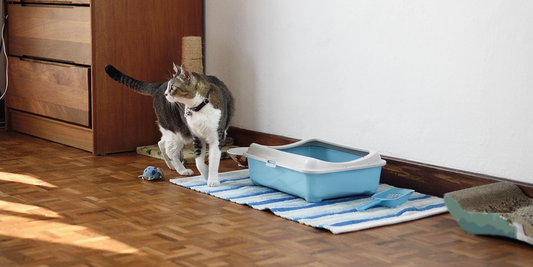Cats have unique urinary habits that can provide crucial information about their health. Monitoring their urinary frequency involves observing how often they visit the litter box, the amount of urine produced, and any changes in behavior during these visits. This seemingly routine aspect of pet care can offer early indicators of various health conditions, including urinary tract infections, kidney problems, diabetes, and more. By being attuned to your cat's urinary habits, you can catch potential health issues early, leading to timely veterinary intervention and a happier, healthier feline companion.
What Risks Are You Taking When Not Knowing Your Cat's Urinary Frequency?
Neglecting to monitor your cat's urinary frequency can lead to several risks and consequences that affect their well-being and quality of life. Some of the risks include:
1. Unnoticed Health Issues
Cats are masters at hiding discomfort, and changes in their urinary habits could be a sign of an underlying health problem. Without regular monitoring, you might miss subtle signs of urinary tract infections, bladder stones, or even more severe issues like kidney disease.
2. Delayed Treatment
Early detection of health problems is key to effective treatment. If you're not aware of your cat's irregular urinary patterns, you might miss the window for early intervention. Delayed treatment can worsen the condition, making it harder to manage and potentially affecting your cat's longevity and comfort.
3. Increased Veterinary Bills
Untreated urinary issues can escalate quickly, leading to emergency veterinary visits that are not only stressful for your cat but also heavy on your wallet. Routine monitoring helps catch problems early, preventing the need for costly emergency care.
4. Reduced Quality of Life
Imagine the discomfort of a urinary infection or a bladder issue. Cats that suffer from untreated urinary problems can experience pain, stress, and a diminished quality of life. Monitoring their urinary habits ensures their well-being and happiness.
5. Behavioral Changes
Cats might develop behavioral changes when dealing with urinary discomfort. They could start avoiding the litter box, urinating outside of it, or showing signs of distress. These behaviors can strain your bond with your pet and create a stressful environment at home.
6. Impact on Bonding
A strong bond with your cat is built on trust and understanding. Not addressing their health needs can lead to a breakdown in this bond, as your cat might associate you with their discomfort.
Understanding the Signs: What to Watch For
To effectively monitor your cat's urinary frequency, it's important to know the signs of potential issues. Keep an eye out for:
- Frequent trips to the litter box
- Straining or discomfort during urination
- Blood in the urine
- Excessive grooming of the genital area
- Changes in urine color, odor, or consistency
- Crying or meowing while urinating
If you notice any of these signs, it's time to consult your veterinarian for a thorough examination.
Tips for Monitoring Your Cat's Urinary Frequency
Ensuring your cat's urinary health involves a proactive approach. Here are some tips to help you monitor their urinary frequency effectively:
1. Create a Routine
Establish a consistent feeding and litter box schedule. Regular routines make it easier to notice changes in your cat's habits.
2. Observe the Litter Box
Check the litter box daily for any changes in urine color, odor, or blood. Abnormalities can signal potential health issues.
3. Stay Hydrated
Proper hydration supports urinary health. Ensure your cat has access to fresh and clean water at all times.
4. Balanced Diet
Feed your cat a well-balanced diet that supports urinary health. Consult your vet for recommendations.
5. Regular Vet Visits
Schedule annual check-ups with your veterinarian. Regular exams can catch problems early and ensure your cat's well-being.
FAQs
Q: Can stress affect my cat's urinary frequency?
A: Yes, stress can lead to changes in urinary habits. Cats are sensitive to environmental changes, and stressors can contribute to urinary issues.
Q: Should I be concerned if my cat urinates more frequently than usual?
A: Yes, increased urination can be a sign of diabetes or kidney problems. It's important to consult your vet for proper diagnosis and treatment.
Q: Can urinary problems be prevented?
A: While not all issues can be prevented, maintaining a healthy lifestyle, providing proper hydration, and regular veterinary care can significantly reduce the risk of urinary problems.
Q: How can I help my cat if they have urinary discomfort?
A: Consult your vet immediately. They can diagnose the issue and recommend appropriate treatment, which might include medication, dietary changes, or other interventions.
Q: Are there specific breeds more prone to urinary issues?
A: Yes, some breeds are more susceptible to urinary problems, including Persians and Siamese cats. Regular monitoring is especially crucial for these breeds.
Q: Is it normal for my cat's urinary habits to change as they age?
A: Some changes are normal as cats age, but sudden or drastic changes should not be ignored. Consult your vet to rule out underlying health issues.
Conclusion: Prioritize Your Cat's Urinary Health
As a responsible cat owner, it's your duty to prioritize your feline companion's well-being. Monitoring their urinary frequency might seem like a minor aspect of pet care, but it can have a significant impact on their health and happiness. By understanding the risks associated with neglecting this aspect of their care, you're taking a proactive step toward ensuring a long, comfortable, and joyful life for your beloved cat.
Remember, your cat's urinary health is a reflection of your dedication and love as a pet owner. By staying vigilant, maintaining regular vet visits, and being attuned to your cat's behaviors, you're not only preventing potential health issues but also fostering a strong and trusting bond with your feline friend.








